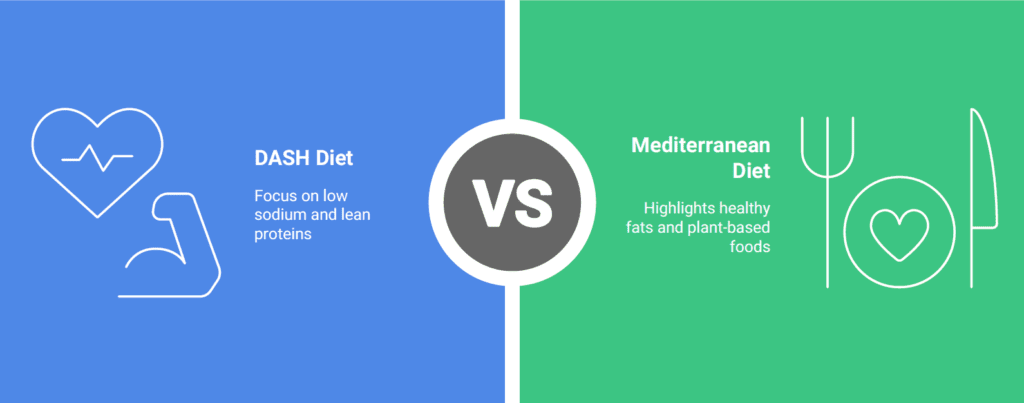As a clinical dietitian, addressing chronic diseases through dietary interventions is central to my practice. Two of the most evidence-based dietary patterns— the DASH (Dietary Approaches to Stop Hypertension) diet and the Mediterranean diet— have consistently demonstrated their efficacy in clinical settings. This article explores the practical application and effectiveness of these diets, including their foundational principles, benefits, clinical implications, and practical examples from real-world scenarios.
Understanding the DASH Diet
Originally developed to manage hypertension, the DASH diet emphasizes consuming fruits, vegetables, whole grains, lean proteins, and low-fat dairy products while limiting sodium intake, red meats, sweets, and sugary beverages. Rich in potassium, calcium, magnesium, and dietary fiber, the DASH diet addresses the root dietary contributors to hypertension and cardiovascular disease. Clinical trials have demonstrated that adherence to the DASH diet can reduce systolic blood pressure by an average of 8-14 mmHg, significantly decreasing cardiovascular risk. Additionally, its nutrient-rich framework has broader benefits, including improved cholesterol profiles and weight management.
Practical Clinical Example:
One of my patients, a 58-year-old male diagnosed with stage 1 hypertension, was advised to adopt the DASH diet. Through dietary education, meal planning assistance, and regular follow-ups, the patient successfully transitioned to healthier eating habits. Within three months, his systolic blood pressure decreased from 145 mmHg to 132 mmHg, reducing the need for pharmacological interventions and showcasing the diet’s real-world effectiveness in clinical practice.
Exploring the Mediterranean Diet
Characterized by high consumption of plant-based foods such as fruits, vegetables, legumes, nuts, and whole grains, along with healthy fats primarily from olive oil, moderate intake of fish and poultry, and limited consumption of red meat and processed foods, the Mediterranean diet is widely celebrated for its holistic health benefits. It supports cardiovascular health, aids in diabetes prevention and management, and contributes to longevity and overall well-being.
Practical Clinical Example:
A 45-year-old female patient with prediabetes incorporated the Mediterranean diet into her lifestyle under clinical guidance. Through structured nutritional counseling emphasizing fresh, minimally processed foods, healthy fats, and balanced meals, the patient effectively reduced her HbA1c levels from 6.2% to 5.7% within six months. This improvement moved her back into the normal glycemic range, affirming the diet’s potential for diabetes management and prevention.
Comparative Effectiveness and Clinical Applications
- Cardiovascular Benefits: Both diets significantly improve lipid profiles, reducing LDL cholesterol, triglycerides, and blood pressure, thus lowering overall cardiovascular risk.
- Diabetes Management: The Mediterranean diet, in particular, demonstrates significant efficacy in improving glycemic control, insulin sensitivity, and reducing the incidence of type 2 diabetes.
- Weight Management and Obesity: Due to their high fiber content, nutrient density, and emphasis on whole foods, both dietary patterns facilitate sustainable weight loss and maintenance, promoting long-term health and preventing obesity-related complications.
- Inflammation Reduction: Both dietary patterns have anti-inflammatory effects due to their high antioxidant content, beneficial in managing chronic inflammatory conditions.
Nutritional Facts for Clinical Dietitians:
- DASH Diet: Clinical research consistently shows optimal blood pressure reduction when sodium intake is limited to approximately 1500 mg/day.
- Mediterranean Diet: Major studies, including the landmark PREDIMED trial, indicate a 30% reduction in major cardiovascular events among individuals strictly adhering to this dietary approach compared to traditional low-fat diets.
Recommendations for Clinical Practice
As clinical dietitians, recommending dietary patterns such as the DASH and Mediterranean diets should involve personalized dietary counseling that takes patient preferences, cultural background, socioeconomic status, and specific health goals into account. Emphasizing patient education, practical meal planning, and consistent follow-up can significantly enhance compliance and outcomes.
Incorporating these evidence-based dietary interventions into routine clinical practice not only supports the management of chronic diseases but also empowers patients with sustainable dietary habits, reinforcing nutrition’s critical role in comprehensive healthcare.




http://passo.su/forums/index.php?autocom=gallery&req=si&img=4254